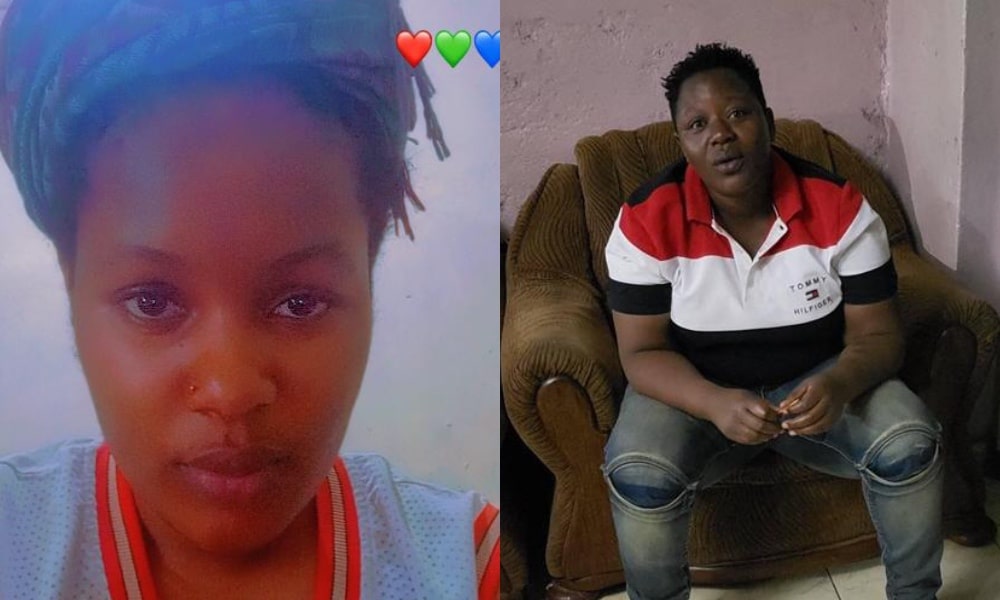A lesbian couple have been separated by Congolese border officials all because they posted TikTok videos of themselves hugging and kissing. (Screen captures via TikTok))
A lesbian couple says they have been persecuted by the Democratic Republic of Congo because they shared a TikTok video of them hugging and kissing.
One half of the couple visited Rwanda, which shares a border with the Congo, only for Congolese border security to prevent her from returning because she is “promoting lesbianism”.
Carine, a 20-year-old from Rwanda, is in a relationship with 31-year-old Congolese woman Noé. The couple lives in Bukavu, in the Congolese province of South Kivu, in the Congo.
On 12 April, Carine, who works at a bistro, returned to the Congo after visiting her older sister in Rwanda. She went through Pont Ruzizi II, which serves as a border custom between Rwanda and the Congo, as she had done so many times before.
But border agents from the Direction Général de Migration (DGM), part of the Congo’s interior and security ministry, allegedly barred her from entering.
“The DGM asked her for her visa and her [identification documents] then told her that in the Congo it is forbidden by law to be a lesbian,” Noé told PinkNews.
DGM staff accused Carine of “promoting lesbianism”, Carine claimed. Same-sex acts are technically legal in the Congo but public displays of same-sex affection – still considered taboo – are persecuted under obscure public decency laws.
A 2010 report by the US Department of State found that state security forces often “harass” LGBTQ+ Congolese people with impunity.
“They showed her our videos on TikTok. Since the practice is not yet authorised in the Congo, Carine found herself at the border and refused re-entry, being considered an instigator of this practice,” Noé added.
Agents then “brought Carine back to Rwanda as this practice is not allowed in the Congo”, her lawyer Me Alphonso Cibembe said.
In one of the TikTok videos used by immigration officials and seen by PinkNews, Carine and Noé hug, kiss and laugh together to the tune of “I Will Always Love You” by Whitney Houston.
But because of this, Carine has for weeks been stuck in Rwanda, leaving her defeated and desperate to be reunited with her partner.
Anti-LGBTQ+ attitudes are commonplace in Rwanda. Some face bogus arrests, abuse and must hide who they are to survive, the Human Rights Watch says.
“I need to see Noé,” Carine said. “I want to go back to Bukavu to see her.”
Border agents in the Congo ‘threaten’ lesbian woman and take away her visa
Border security officials have also allegedly sought Noé. To avoid the capture of agents, she has fled home and now sleeps in a kiosk she runs that sells alcohol, cigarettes and snacks.
She has next to no money and lives off the food in the kiosk, Cibembe said.
Noé had no other choice but to run. “My family chased me away,” she said, “so I need my companion, Carine, to come back.”
Noé claimed that security services have sent her “threatening messages” and she feels as if she is a “wanted criminal”.
“I need protection because my security and that of my Carine are in danger,” she said.
On Monday (16 May), Noé was meant to see her family in Rwanda only for DGM workers to “steal” her travel documents at the border. She can no longer leave the Congo as a result.
“I am not even free to move around,” she alleged, “I am not really safe.”

Cibembe has accused the DGM of “trampling on the law” to detain the couple.
“The Congolese legislature is clear about the protection of LGBTQ+ people,” the human rights activist said, citing a 2008 law that enshrines those living with HIV, queer people included, with certain protections.
The law states that the “rights and fundamental freedoms” of “homosexuals” must be preserved, Cibembe said.
“How come DGM agents trample on the laws of the state for which they claim to work? They are wrong to snatch the visa of Carine,” he said.
“We demand justice, her rights be restored and that Noé is protected because she is in danger.”
Savie asbl NGO LGBT, an LGBTQ+ advocacy group that fights for equality in the Congo, Rwanda, Burundi and Uganda, claimed it has seen a rise in visa denials among LGBTQ+ people ahead of the December 2023 presidential elections.
Politicians, the organisation said, are using LGBTQ+ people to “divide voters and gain local community support”. To stand up for LGBTQ+ would be “risky” for elected officials wary of how “public opinion is largely conservative”.
“Carine and Noé show that persecution against LGBTQ+ is worsening due to a lack of laws and hatred against the community, all blessed by church leaders,” Savie asbl NGO LGBT said.
Carine’s Rwandan passport, seen by PinkNews, shows that she has frequently travelled between the two African countries for the past two years. She went there and back on 6 April without hassle.
The most recent passport stamps show she left the Congo and came to Rwanda on 12 April. Now she’s unsure if she’ll ever see Noé again.
“All this happened,” Noé said, “because I posted a simple video on TikTok.”
PinkNews contacted the Direction Général de Migration for comment.
